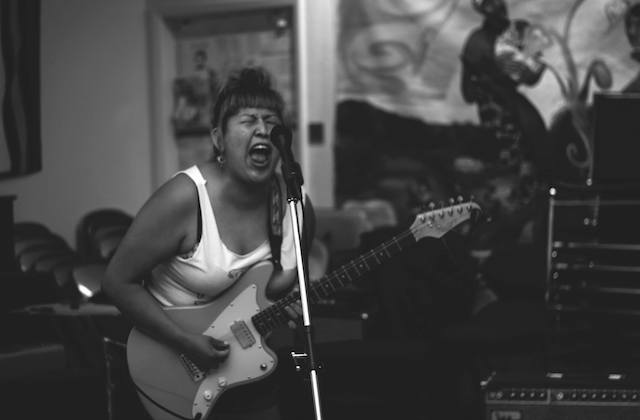Rebecca Jones
City: Albuquerque, NM
Movement: Sexual health counselor with Planned Parenthood who works primarily with Native and Latinx communities; organizer
Music: Singer and guitarist in punk bands Weedrat, Nizhóní Girls and Litter Brain, all of whom feature all- or part-Native lineups and address sexism, anti-LGBTQ discrimination and anti-Native racism
Story: Symbols of Native peoples’ oppression and resilience surrounded Rebecca Jones growing up. As she says, that oppression runs as deep as the preferred word for her tribe. "I am Diné, and that’s how we say it in our language," she says of her people, whom much of the nation refer to as "Navajo"—a word Jones traces back to Spanish rulers’ term for "horse thief."
The northern Arizona reservation near where Jones grew up still uses that name. Jones spent her childhood in nearby Flagstaff, frequently visiting and staying on the reservation. She encountered punk rock in high school, but didn’t find her voice as a guitarist or lead singer until she moved to Albuquerque, which she says hosts an "awesome" and "majority Brown" punk community. She co-founded the all-women band Litter Brain before creating Weedrat, an all-Diné band for which she writes and sings the lyrics. Jones says that Weedrat helped her move past the internalized misogyny of predominantly male and lyrically sexist rock groups. That hegemony still remains in many punk scenes, and can make touring an uncomfortable experience.
"There are stages where it’s just White people playing, without many groups with people of color," she explains. "When I went on tour, it was a little weird. I felt different and out-of-place in some areas."
Being a Native woman, Planned Parenthood sexual health educator, frequent organizer and hard-rocking musician in the southwest means that she encounters frequent pushback and microaggressions, both in work settings and at venues. "I’m always going to face people who are anti-reproductive health," she says. "I get a lot of mansplaining around my music, people messing with my gear during sets—just being a woman of color, you get those microaggressions every day," she adds about the latter.
She recognizes those issues, and their roots in colonization, on the reservation as well. "Heteropatriarchy is real there, and that’s not the way that our culture is," she explains. "We were a matriarchal society prior to colonization, and it’s hard because we have such high rates of domestic and sexual violence in our communities."
Aside from her daily work and the confrontational sound and lyrics of her three bands, Jones seeks to empower indigenous women on the reservation by organizing benefit shows that also incorporate reproductive education. The upcoming Asdzáá Warrior Fest will exclusively feature all-Native groups centered on women and LGBTQ members. "It’s important for me to empower the women in our community because it hits close to home," she says. "I grew up in [a familiar] type of violent situation, and it’s nothing new in our community."
Jones plans to continue this combination of advocacy and music, and ultimately see rates of violence against Native women decrease in her lifetime. "If someone can get this education and break that cycle of violence in their life, I know that I’ve done a good job," she says. "And being a Brown girl playing music in front of people, I can spread that to another young girl who wants to start a band."
Listen to Weedrat’s 2016 release, "III," below:
